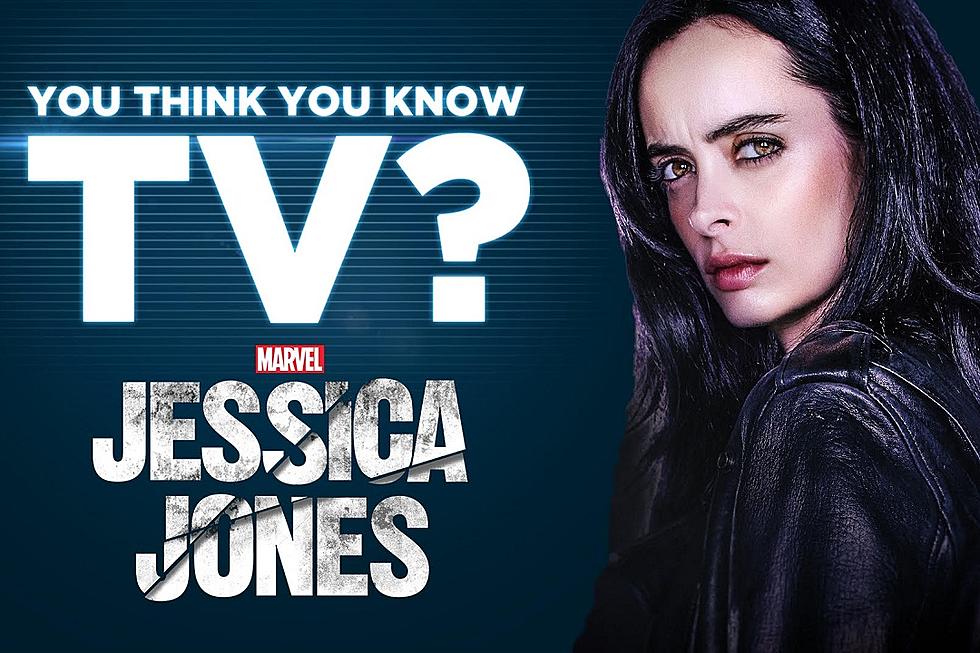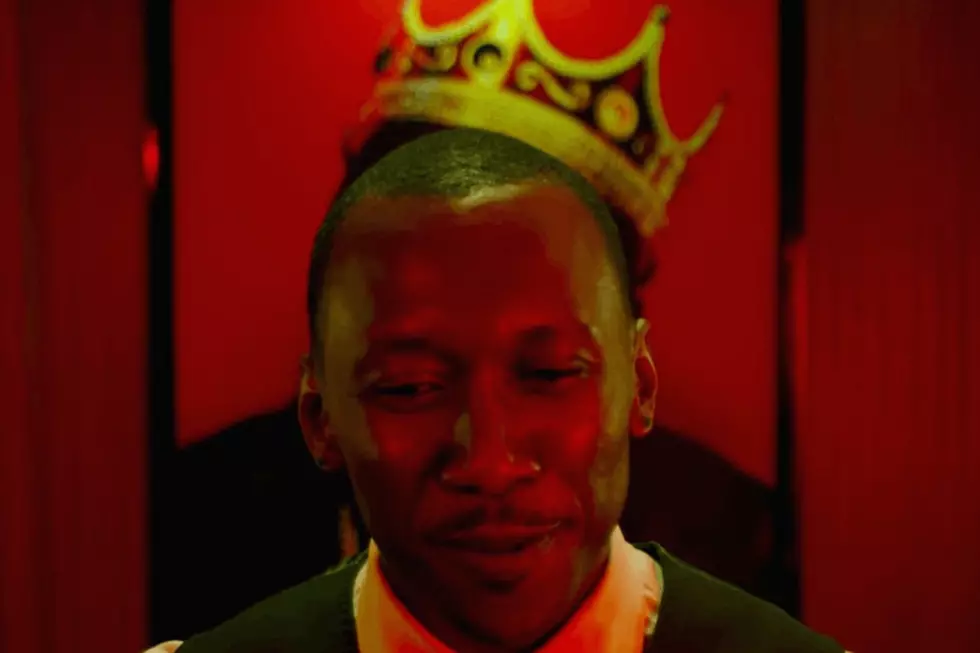
‘Alias’ Jessica Jones: A Critical Look Back At Marvel’s Mature Readers Hero And New Netflix Star
With a new hardcover omnibus of Alias by Brian Michael Bendis and Michael Gaydos, Marvel re-releases one of the most critically successful comics of the early 2000s. Apart from its various awards nominations and wins, it was one of just a few comics that everybody seemed to love, during an era when Marvel was equal parts creatively daring and ridiculously misguided. The first comic published under the mature readers MAX imprint, Alias officially broke ground on Marvel's R-rated label with an emphatic F-word, which immediately strikes one as both obvious and necessary. Unlike many other titles that sprung from the MAX imprint, though, Alias went far beyond than the gimmick of sex and cuss words in the Marvel Universe, and was easily one of the most readable comics on the stands for its entire twenty-eight-issue run.
That's just my memory, though, and I wouldn't exactly describe it as sharp. So how good is it on a re-read? Particularly as Marvel prepares a new live-action Netflix series based on the book, and has hinted as recently as last week that Jessica might be "getting back to work".
A street-level detective series with an understated, indie comics style, Alias follows former superhero and current private investigator Jessica Jones into the darker corners of the Marvel Universe. As the sole proprietor of Alias Investigations, Jones takes the cases of those on the outside of the grand struggle: the human flotsam left in heroes' and villains' wake; the folks looking up from the street at the blessed zigzagging through the sky and wondering why it shouldn't be them; the victims and the nobodies.
Originally planning to use Spider-Woman Jessica Drew as his lead, Bendis instead created an entirely new character for Alias and presented her as an obscure, pre-existing Marvel property, a trick I completely fell for (even though The Sentry, introduced similarly didn't fool me for a second). As the story goes: once known as the D-list superhero Jewel, Jessica Jones gave up the costume racket to be a private detective, using her super-strength, limited invulnerability, and not-quite-flight to take pictures of cheating spouses, knock out the occasional angry husband, and put away a British rock band's worth of hard alcohol every day. A chain-smoking, hard-drinking, sexually active woman with a mouth like a drunken sailor with Tourette's, Jessica Jones is immediately formidable, likable, interesting, and full of pain just barely hidden by her rough exterior.
Slowly and carefully, Bendis and Gaydos reveal the emotional core of Jessica Jones and the trauma that shaped her by putting the character through increasing amounts of professional and personal turmoil. At first, the cases she takes seem completely random, just interesting new scenarios built around the "extras" in the Marvel Universe. Throughout the series though, it becomes clear that in each investigation, something new is uncovered about Jessica herself.
In her first superhero-adjacent assignment, Jones takes the case of a missing woman who turns out to be Captain America's girlfriend, discovers Cap's secret identity (shortly before he came out as Steve Rogers anyway), and finds the missing woman murdered. Even though Jones has a chance to make some real tabloid money from her knowledge of Steve, she doesn't, not just because it's the right thing to do, but because she knows very well the dangers of having a secret life; the perils of an alias. From there, she runs across a Rick Jones impersonator and is reminded of her own former idolization of the supergods, a personality trait that seems anathema to such a jaded character.
From a missing teenage superhero to a group of family members seeking an admission of guilt from the villain who killed them, every case forms some link to Jessica's personality or past. Some of those connections are obvious, but it's mostly implied: it's up to the reader to understand what piece of herself Jessica sees in a teenage runaway from a mutant-hating town; it's incumbent upon you to puzzle out the trauma that withered away at this once-gleaming protector of the innocent and reduced her to an outwardly cynical and hopeless alcoholic.
And there isn't much to hope for. Very few story arcs in Alias wind up with happy endings; every triumph is tempered by loss, and there is always collateral damage. At any moment Jones seems in danger of losing herself completely, of letting the weight of her past and the grisly realities of life dragging her down. It's a war of attrition with Jones, a constant battle to get just one more thing right than she gets wrong. While taking jobs like body-guarding Daredevil Matt Murdock after his identity is revealed to the world and searching for J. Jonah Jameson's foster daughter, she constantly comes up against situations she shouldn't be able handle. Frequently, she fails -- she doesn't get where she needs to be in time, she doesn't stop more bad things from happening, she completely fails in her relationship with Ant-Man Scott Lang, completely fails to understand her relationship with Hero For Hire Luke Cage, and always seems one step behind the rest of the world.
Eventually, Jessica pulls out enough wins to catch up. Behind her traumatized exterior and self-destructive personality is something pure. Through J. Jonah Jameson, Bendis says it himself -- peel the onion, keep cutting away at layer after layer until you find the heart of story. At Alias' conclusion, after her final confrontation the Purple Man, the villain who tortured her for several months, Jessica Jones' true heart is laid bare before the reader, and despite all the self-hatred and guilt she's built up through the years, she's able to recover.
That's what Alias is really about: recovery. Taking the pain others have given you and turning it into something better, making the world a better place in whatever small way possible. To this day, Jessica Jones is one of the most complete, realistic, and engaging characters in recent memory, and her journey from hopeless wreck to expectant mother is endlessly compelling.
As masterful as the character work is, Alias is not without its flaws. There's a scene in Fortune and Glory, the Bendis-written-and-drawn autobio comic about his experiences in Hollywood (still one of my favorites) where his agent tells him that he writes too much dialogue. So Bendis watches his favorite movies, notices how little dialogue there actually is, and takes the lesson to heart. In real life, it took another decade to sink in. Don't get me wrong: Bendis's dialogue is and always has been very realistic. He understands the psychology and motivations of all of his characters, and he's able to write them all with distinct cadences and tendencies. Every line of dialogue in Alias hits the ear very authentically, and with all the stops and stammers and repeated words, you really can hear the characters speaking in your head. The problem with that approach is when the volume of word balloons creates disharmony with the pictures, which I think does happen from time to time in Alias.
Bendis developed his trademark two-page spread style in books like Jinx and Goldfish, which he drew himself. Alias uses the device to tell its' characters stories, and for the first chunk of the book, Michael Gaydos seems to struggle with it slightly, but after a while the artist develops some very elegant solutions for the long conversational back-and-forths, which have in the years hence become iconic in and of themselves, at least for a certain generation of Marvel readers. With a moody, minimalist look and nuanced, expressive characters, Gaydos's stylized realism paints the world of Alias with a unique aesthetic. His inventive layouts, realistic settings, and brilliantly subtle acting, along with the muted color palette of Matt Hollingsworth, realized the type of character-intense experience that Bendis wanted Alias to be. You just seem to immerse in it, to linger on every panel, hearing characters' speech without really reading it.
But its a very fine line tread in Alias, and a few times, Bendis and Gaydos end up on the other side of it, especially in the first year or so. Panels are wasted on slow zooms into expressions that never change (a common trait in a lot of Bendis's early books), while phalanxes of balloons clog the page, and in some places you find your eye skipping through a few lines of speech just to get to something else.
Throughout the series, though, you can see both creators evolving. Gaydos's layouts get smoother, his sense of negative space evolves, and his characters become even more natural and expressive. Bendis -- who never lacked in strong plots, surprising twists, and interesting, believable characters -- consistently ratchets up the intensity, sometimes by stripping out words altogether, often to magnificent effect:

In the final issue of Alias, Bendis included an afterword that explained just why the series was ending: he wanted to play with the big toys. As an R-rated series, Alias was only allowed to use certain characters, and sparingly. Luke Cage, who had his own MAX series around the same time, was a series regular, but mainstreamers like Captain America and Spider-Man could only get cameos in Alias, and certainly couldn't be seen anywhere near the types of adult activities Jones and Cage ran into (namely sex, drugs and ultra-violence). Bendis wanted to tell bigger stories with higher stakes and bigger characters, and the only way to do that was to move Jessica Jones to the mainstream.
And it totally killed her.
In followup series The Pulse, all the bite and sting is taken out of Jessica Jones. The adults-only world is where she truly belonged, where she and others could #!@% or $#!^ without &*$%ing symbols because that's how people really talk. Despite my criticism of Bendis's verbosity in Alias, it still defined this character, and in particular, losing her ability to curse shaved off some of that reality -- not to mention the ability to smoke, drink and do other things that pregnant women should probably avoid. But it turns out that in the case of Jessica Jones, all of that stuff actually mattered.
Alias is dark, grimy, and damaged, and that's absolutely integral to its impact. The Pulse is clean, glossy, and antiseptic, and certainly wasn't helped by the fact that Michael Gaydos only drew the last couple of issues. Jessica Jones is no longer on the periphery with the poor and ugly and traumatized, she's right in the heart of the bright superhero action with the beautiful people. Shortly after, she was a big piece of The New Avengers, right in the middle of Civil War and Secret Invasion and all the big universe stuff, and your mileage will vary on the success of those appearances. But it was the backgrounding of those sorts of events in Alias that added to its unique feel. Where Alias is a crime book about guilt, trauma, and recovery set in a superhero universe, The Pulse is a marginally-interesting book about a pregnant superhero, and once Jessica Jones transitioned to the mainstream, she lost her spark.
In Alias, though, she burned bright. The Alias omnibus is a fantastic collection from beginning to end; full of legitimately dark and credible looks at a sinister edge of the Marvel Universe, and an involving drama that gets into the guts of its lead character in a way few American superhero comics have before or since.
It seems that Bendis, Gaydos and Marvel might agree, as evidenced by the concluding page to the first proper Alias story since the book's conclusion all those years ago. A part of Marvel 75th Anniversary Celebration, an anthology collecting new work that pays homage to the history of the publisher, Bendis, Gaydos and Hollingsworth reunite for a short story that hints at a return for our long lost heroine, one that would be very welcome indeed:
Alias Omnibus is on sale now in finer comics shops and bookstores.
More From ComicsAlliance









